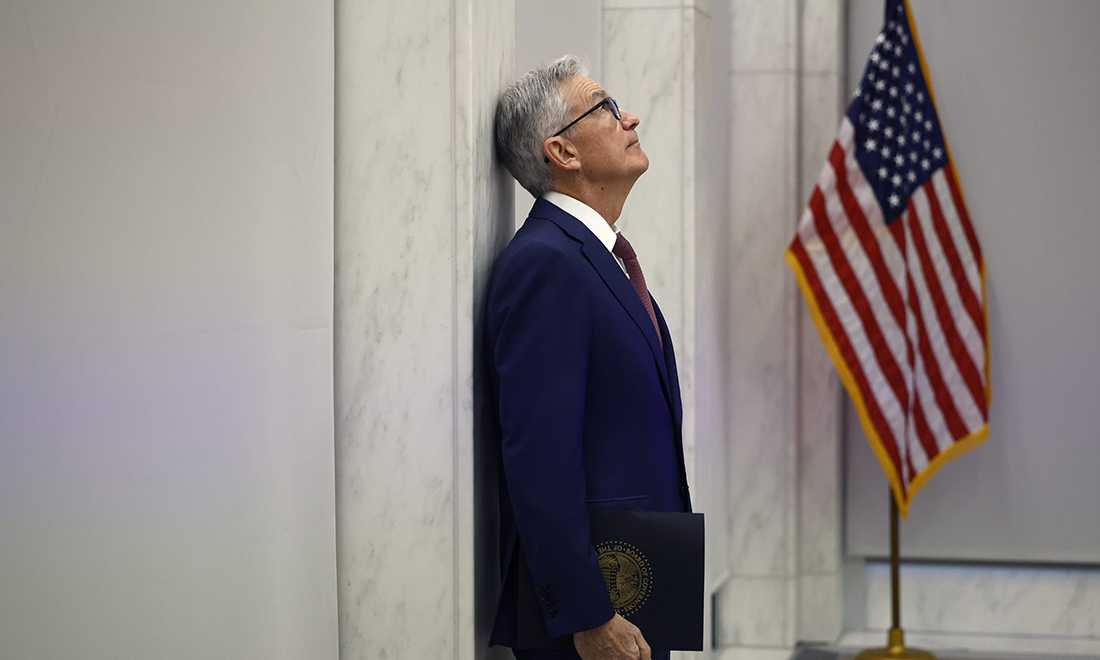
不久前,大多数经济学家和华尔街分析师都预测美国将迎来经济衰退:他们声称恶性通胀、加息和国外的战争,肯定会影响美国经济,最终导致经济崩溃。但去年,金融界开始流传一种新的说法。随着消费者证明了他们应对高利率的韧性,再加上通胀降温,大部分专家开始认为最有可能的结果是“软着陆”,即经济增长放缓但不会出现经济衰退。
现在,年初三份过热的通胀报告以及持续强劲的消费者需求,给软着陆的预测泼了一盆冷水,取而代之的是一种新的情景:“不着陆”。
在三月份德意志银行(Deutsche Bank)对投资者进行的调查中,有近半受访者表示,预计会出现“不着陆”的情景,即经济持续增长,维持低失业率,但尽管美联储加息,通胀却依旧是个难题。
富国银行投资研究所(Wells Fargo Investment Institute)在周一发布的一份报告中,更新了对美国经济的前景展望,也提到了这种观点。虽然该银行并没有特别预测“不着陆”的结果,但研究人员将美国2024年的国内生产总值增长率预测从仅1.3%提高到2.5%,与去年持平。
富国银行还表示,到2024年底,美国的失业率将维持在4.1%,而不是4.7%。相对的通胀率将会略微升高。现在富国银行预测美国的CPI通胀率为3%,而不是之前估计的2.8%。
过去几年,美国经济出人意料地表现强劲,受到了多个因素的影响,包括创纪录的财政支出,尤其是在基建和半导体方面的支出;由于后全球金融危机时代的政策变化和供应问题,美国房地产市场面对高利率的韧性;甚至还有“贪婪性通胀”等。
但富国银行表示,美国经济的表现之所以超出预期,是因为尽管美联储持续加息,但金融条件(衡量借款可用性和借款成本以及金融市场的风险与杠杆的指标)实际上仍较为宽松。
芝加哥联邦储备银行(Chicago Federal Reserve)的全国金融条件指数在美联储的加息周期中一直处在宽松区间,更是在4月5日结束的一周内下降到负0.53,这是自2022年2月以来的最低水平。
经济增长和就业人数增多,对于市场而言通常是好消息,这是富国银行对2024年的预测。该银行的经济学家和研究人员将标普500指数的目标点位预测,从4,800至5,000点的区间,上调至5,100至5,300点的区间。但他们依旧预测今年不会是市场表现出色的一年,这主要是因为美联储政策的影响。
去年,大多数经济学家预测美联储在2024年将进行三次降息,这会刺激市场,甚至有人预测美联储会六次降息。但事实证明,通货膨胀比预想的更难控制,而且经济依旧强劲,因此经济学家们改变了预测。现在富国银行预测2024年,美联储只会进行两次降息,第一次将是在今年夏天,2025年还会进行一次降息。这将使美联储的基金利率到今年年底下降到4.75%至5%的区间,到2025年底下降到4.5%至4.75%的区间。
周一出炉的零售销售报告再次证明美国经济依旧过热,因此富国银行的前景展望可能被证明过于乐观。据人口普查局的报告显示,三月份零售销售环比增长0.7%,而经济学家们普遍预测的涨幅为0.4%。
联邦金融网络公司(Commonwealth Financial Network)高级投资策略师山姆·米利特表示,报告发布后,“由于越来越多人担心会出现不着陆、不降息的情景”,因此债券收益率上升。
他通过电子邮件对《财富》杂志称:“虽然销售增长强劲是代表本季度经济增长的好兆头,但消费者支出大幅增加,会导致消费物价上涨和通胀升高。
但富国银行的经济学家们周一认为,美国经济进入更快增长模式的“转向”,“可能是一个温和的过程”。
他们写道:“总体而言,我们认为经济仍在放缓,这应该会使通胀降温,并允许到2025年适度放宽利率和信贷条款。”
总之,富国银行的团队表示,他们对2024年和2025年的预测是强势美元、大宗商品价格上涨、稳健的收益和相对宽松的金融条件。他们认为,由于地缘政治紧张局势和国外战争的威胁,投资者应该注意经济动荡。(财富中文网)
翻译:刘进龙
审校:汪皓
不久前,大多数经济学家和华尔街分析师都预测美国将迎来经济衰退:他们声称恶性通胀、加息和国外的战争,肯定会影响美国经济,最终导致经济崩溃。但去年,金融界开始流传一种新的说法。随着消费者证明了他们应对高利率的韧性,再加上通胀降温,大部分专家开始认为最有可能的结果是“软着陆”,即经济增长放缓但不会出现经济衰退。
现在,年初三份过热的通胀报告以及持续强劲的消费者需求,给软着陆的预测泼了一盆冷水,取而代之的是一种新的情景:“不着陆”。
在三月份德意志银行(Deutsche Bank)对投资者进行的调查中,有近半受访者表示,预计会出现“不着陆”的情景,即经济持续增长,维持低失业率,但尽管美联储加息,通胀却依旧是个难题。
富国银行投资研究所(Wells Fargo Investment Institute)在周一发布的一份报告中,更新了对美国经济的前景展望,也提到了这种观点。虽然该银行并没有特别预测“不着陆”的结果,但研究人员将美国2024年的国内生产总值增长率预测从仅1.3%提高到2.5%,与去年持平。
富国银行还表示,到2024年底,美国的失业率将维持在4.1%,而不是4.7%。相对的通胀率将会略微升高。现在富国银行预测美国的CPI通胀率为3%,而不是之前估计的2.8%。
过去几年,美国经济出人意料地表现强劲,受到了多个因素的影响,包括创纪录的财政支出,尤其是在基建和半导体方面的支出;由于后全球金融危机时代的政策变化和供应问题,美国房地产市场面对高利率的韧性;甚至还有“贪婪性通胀”等。
但富国银行表示,美国经济的表现之所以超出预期,是因为尽管美联储持续加息,但金融条件(衡量借款可用性和借款成本以及金融市场的风险与杠杆的指标)实际上仍较为宽松。
芝加哥联邦储备银行(Chicago Federal Reserve)的全国金融条件指数在美联储的加息周期中一直处在宽松区间,更是在4月5日结束的一周内下降到负0.53,这是自2022年2月以来的最低水平。
经济增长和就业人数增多,对于市场而言通常是好消息,这是富国银行对2024年的预测。该银行的经济学家和研究人员将标普500指数的目标点位预测,从4,800至5,000点的区间,上调至5,100至5,300点的区间。但他们依旧预测今年不会是市场表现出色的一年,这主要是因为美联储政策的影响。
去年,大多数经济学家预测美联储在2024年将进行三次降息,这会刺激市场,甚至有人预测美联储会六次降息。但事实证明,通货膨胀比预想的更难控制,而且经济依旧强劲,因此经济学家们改变了预测。现在富国银行预测2024年,美联储只会进行两次降息,第一次将是在今年夏天,2025年还会进行一次降息。这将使美联储的基金利率到今年年底下降到4.75%至5%的区间,到2025年底下降到4.5%至4.75%的区间。
周一出炉的零售销售报告再次证明美国经济依旧过热,因此富国银行的前景展望可能被证明过于乐观。据人口普查局的报告显示,三月份零售销售环比增长0.7%,而经济学家们普遍预测的涨幅为0.4%。
联邦金融网络公司(Commonwealth Financial Network)高级投资策略师山姆·米利特表示,报告发布后,“由于越来越多人担心会出现不着陆、不降息的情景”,因此债券收益率上升。
他通过电子邮件对《财富》杂志称:“虽然销售增长强劲是代表本季度经济增长的好兆头,但消费者支出大幅增加,会导致消费物价上涨和通胀升高。
但富国银行的经济学家们周一认为,美国经济进入更快增长模式的“转向”,“可能是一个温和的过程”。
他们写道:“总体而言,我们认为经济仍在放缓,这应该会使通胀降温,并允许到2025年适度放宽利率和信贷条款。”
总之,富国银行的团队表示,他们对2024年和2025年的预测是强势美元、大宗商品价格上涨、稳健的收益和相对宽松的金融条件。他们认为,由于地缘政治紧张局势和国外战争的威胁,投资者应该注意经济动荡。(财富中文网)
翻译:刘进龙
审校:汪皓
Fed Chairman Jerome Powell prepares to deliver remarks to the Federal Reserve’s Division of Research and Statistics Centennial Conference, on Nov. 8, 2023, in Washington, D.C.
Not long ago, most economists and Wall Street analysts had a recession penciled into their economic forecasts for the U.S.: Stubborn inflation, rising interest rates, and foreign wars were sure to weigh on the economy until it cracked, they said. But throughout last year, a new narrative developed in the world of finance. With consumers proving their resilience to higher interest rates, and inflation cooling, most experts began to see a “soft landing”—where growth slows but the economy avoids a recession—as the most likely outcome.
Now, three hot inflation reports to start the year and continued signs of robust consumer demand have thrown cold water on the soft landing narrative, and something new is taking over: the “no landing” scenario.
Nearly half of all investors polled by Deutsche Bank in March said they expect a “no landing” scenario, where the economy continues to grow and unemployment stays low, but inflation remains an issue despite the Federal Reserve’s interest rate hikes.
The Wells Fargo Investment Institute piled on to that narrative in a note Monday upgrading its outlook for the U.S. economy. While the bank didn’t specifically predict a “no landing” outcome, researchers lifted their gross domestic product growth forecast from just 1.3% for 2024 to 2.5%—the same as last year’s rate of 2.5%.
Wells also said the U.S. unemployment rate will sit at 4.1% instead of 4.7% by the end of 2024. The tradeoff will be slightly higher inflation. The bank now sees U.S. CPI inflation of 3%, instead of its previous 2.8% estimate.
Several factors have been named to account for the unexpected strength of the U.S. economy over the past few years, including record fiscal spending, particularly on infrastructure and semiconductors; the housing market’s resilience to higher rates owing to post–Global Financial Crisis policy changes and supply issues; and even “greedflation.”
But Wells Fargo said the economy has outperformed expectations because financial conditions—a measure of the availability and cost of borrowing, as well as risk and leverage in financial markets—are actually accommodative, despite the Fed’s rate-hiking campaign.
To that point, the Chicago Federal Reserve’s National Financial Conditions Index has been in accommodative territory throughout the Fed’s hiking cycle, and decreased to –0.53 in the week ended April 5—its lowest level since February 2022.
More growth and more employed Americans are typically good news for markets, and that’s what Wells Fargo sees in 2024. The bank’s economists and researchers upgraded their S&P 500 target from a range between 4,800 and 5,000 to a range between 5,100 and 5,300. Still, they don’t expect a banner year, and that’s largely because of Fed policy.
Last year, most economists were forecasting three market-juicing interest rate cuts in 2024, with some predicting as many as six. But with inflation proving more difficult to tame than anticipated, and the economy still running strong, that forecast is shifting. Wells Fargo is now expecting just two interest rate cuts in 2024, starting this summer, followed by one more cut in 2025. That would leave the Fed funds rate in a range between 4.75% and 5% at the end of this year, and 4.5% to 4.75% at the end of 2025.
Wells Fargo’s outlook might even prove optimistic after Monday’s retail sales report served as yet another piece of evidence that the economy is still running hot. Retail sales jumped 0.7% month over month in March, the Census Bureau reported, compared with economists’ consensus expectations for a 0.4% rise.
Sam Millette, senior investment strategist for Commonwealth Financial Network, noted that bond yields rose after the report, “due to rising concerns of a potential no-landing, no-rate-cut scenario.”
“While the strong sales growth is a good sign for economic growth in the quarter, the surge in consumer spending could contribute to high consumer prices and cause additional inflation,” he told Fortune via email.
But Wells Fargo’s economists argued Monday that the economy’s “pivot” into a faster growth mode is “likely to be modest.”
“On balance, we believe the economy is still slowing, which should cool inflation and allow for a modest easing of interest rates and credit conditions into 2025,” they wrote.
Overall, Wells’ team said they expect a strong dollar, rising commodity prices, robust earnings, and relatively accommodative financial conditions in 2024 and 2025. And with the threat of geopolitical tensions and foreign wars, they argued, investors should expect volatility.






